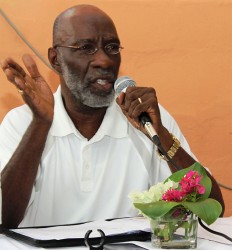Gecom Commissioner, Vincent Alexander, has said that the argument being made that the no-confidence motion which was tabled in Parliament made it difficult to hold local government elections does not make much sense.
According to him, local government elections are due and government could simply call them. He said: “Gecom has said it needs six months to deal with elections. Calculation of those six months starts when the government says it wants elections.”
The Gecom Commissioner went on to explain, “The things we have to do to implement the new [local government] system require six months” because Gecom will have to prepare over 500 digital ballot papers. He said in Linden there would be need for nine different ballot papers because each constituency has its own candidate. Stating that the country has six municipalities, Alexander reiterated that five hundred ballot papers would be required to cover the municipalities.

He said only when the local government election is called would Gecom know who the candidates are, and only when Gecom knows the candidates would it be able to prepare the ballot papers. “So, there are things to be done that would take time and Gecom cannot do those things unless the elections have been called. So, the earlier they call them the earlier you get elections. The later they call then the later we get elections.”
He said if the no-confidence motion had been passed then national elections would have been held in three months.
Stressing that the two elections would not clash, Alexander said that even if they were to clash, the laws of Guyana specify that where there are two sets of elections, the national elections take precedence over any other elections. “We don’t have any problems. We have people causing the problems,” Alexander said.
His comments came while he was fielding questions immediately following a presentation he made at the November Media Forum of the Linden Fund Trust on Friday at the LEN Building, Republic Avenue, Linden. The half-hour presentation was entitled ‘Local Governance, Promise, Practice, Opportunity.’
During his response to the question about how he views the call for local government elections by a wide cross-section of people in Guyana, Alexander responded, “The people are merely expressing what they are entitled to since the laws of Guyana provide for local government elections to be held every two years. They were postponed from 1997 up to 2012 annually by consensus in the Parliament … there was some legality to postponement.
“In 2013, there was no postponement. In 2014, there had been no postponement. It was due January 2013. It became due in 2013 because Parliament had not postponed it; the law says it must be held.”









